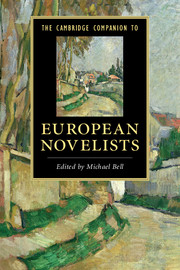Book contents
- Frontmatter
- Introduction: The novel in Europe 1600–1900
- 1 Miguel de Cervantes (1547–1616): Don Quixote: romance and picaresque
- 2 Daniel Defoe (1660–1731): Journalism, myth and verisimilitude
- 3 Samuel Richardson (1689–1761): The epistolary novel
- 4 Henry Fielding (1707–1754): The comic epic in prose
- 5 Jean-Jacques Rousseau (1712–1778): The novel of sensibility
- 6 Laurence Sterne (1713–1768): The fiction of sentiment
- 7 Johann Wolfgang von Goethe (1749–1832): The German Bildungsroman
- 8 Walter Scott (1771–1832): The historical novel
- 9 Stendhal (1783–1842): Romantic irony
- 10 Mary Shelley (1797–1851): The Gothic novel
- 11 Honoré de Balzac (1799–1850): ‘Realism’ and authority
- 12 Charles Dickens (1812–1870): Englishman and European
- 13 George Eliot (1819–1880): Reality and sympathy
- 14 Gustave Flaubert (1821–1880): Realism and aestheticism
- 15 Fyodor Dostoevsky (1821–1881): ‘Fantastic realism’
- 16 Leo Tolstoy (1828–1910): Art and truth
- 17 Émile Zola (1840–1902): Naturalism
- 18 Henry James (1843–1916): Henry James's Europe
- 19 Marcel Proust (1871–1922): A modernist novel of time
- 20 Thomas Mann (1875–1955): Modernism and ideas
- 21 James Joyce (1882–1941): Modernism and language
- 22 Virginia Woolf (1882–1941): Re-forming the novel
- 23 Samuel Beckett (1906–1989): Language, narrative, authority
- 24 Milan Kundera (1929–): The idea of the novel
- Conclusion: The European novel after 1900
- Further reading
- Index
- Cambridge Companions To …
18 - Henry James (1843–1916): Henry James's Europe
Published online by Cambridge University Press: 28 September 2012
- Frontmatter
- Introduction: The novel in Europe 1600–1900
- 1 Miguel de Cervantes (1547–1616): Don Quixote: romance and picaresque
- 2 Daniel Defoe (1660–1731): Journalism, myth and verisimilitude
- 3 Samuel Richardson (1689–1761): The epistolary novel
- 4 Henry Fielding (1707–1754): The comic epic in prose
- 5 Jean-Jacques Rousseau (1712–1778): The novel of sensibility
- 6 Laurence Sterne (1713–1768): The fiction of sentiment
- 7 Johann Wolfgang von Goethe (1749–1832): The German Bildungsroman
- 8 Walter Scott (1771–1832): The historical novel
- 9 Stendhal (1783–1842): Romantic irony
- 10 Mary Shelley (1797–1851): The Gothic novel
- 11 Honoré de Balzac (1799–1850): ‘Realism’ and authority
- 12 Charles Dickens (1812–1870): Englishman and European
- 13 George Eliot (1819–1880): Reality and sympathy
- 14 Gustave Flaubert (1821–1880): Realism and aestheticism
- 15 Fyodor Dostoevsky (1821–1881): ‘Fantastic realism’
- 16 Leo Tolstoy (1828–1910): Art and truth
- 17 Émile Zola (1840–1902): Naturalism
- 18 Henry James (1843–1916): Henry James's Europe
- 19 Marcel Proust (1871–1922): A modernist novel of time
- 20 Thomas Mann (1875–1955): Modernism and ideas
- 21 James Joyce (1882–1941): Modernism and language
- 22 Virginia Woolf (1882–1941): Re-forming the novel
- 23 Samuel Beckett (1906–1989): Language, narrative, authority
- 24 Milan Kundera (1929–): The idea of the novel
- Conclusion: The European novel after 1900
- Further reading
- Index
- Cambridge Companions To …
Summary
The inclusion in a survey of European novelists of Henry James, born in New York, and who did not take British nationality until 1915, just a few months before his death, requires some explanation. The fact that he spent only the first year of his forty-one-year permanent, self-imposed exile from the United States in Continental Europe (in Paris), retreating from there to England, would perhaps seem to qualify his grounds for inclusion still further. However, this mere analysis of dates conceals a literary career which James himself always, from the earliest years, conceived in terms arguably more European than that of any other major practitioner of the novel in English in his period.
James was brought to Europe in infancy by his parents, in the 1840s, and then more significantly, for a three-year period, 1855–8, at the beginning of his teens, residing variously in Paris, Boulogne and Geneva, while he returned in 1859 and attended the École Toepffer as well as studying German in Bonn. In the early 1870s (1869–73) he travelled on the Continent, chiefly in Italy rather than France, owing to the Franco-Prussian War waged in this period. In 1875, coming to Europe for the first time unaccompanied as an adult, he endeavoured to settle in Paris, spending a year there until 1876 when, suffering some setbacks in his project to establish himself as a writer of ‘letters home’ reporting for an American journal on the Parisian scene, he moved on to London, where his career was to become established for the remainder of his life.
- Type
- Chapter
- Information
- The Cambridge Companion to European Novelists , pp. 310 - 326Publisher: Cambridge University PressPrint publication year: 2012

